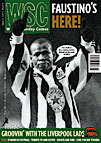 Tom Davies argues that the one-year ban imposed on Leyton Orient's Roger Stanislaus for pre-match drug taking is both unfair and inconsistent
Tom Davies argues that the one-year ban imposed on Leyton Orient's Roger Stanislaus for pre-match drug taking is both unfair and inconsistent
Two of the symptoms widely attributed to cocaine use are paranoia and confusion. Similar feelings can be experienced at a fraction of the cost by trying to make sense of the contradictory reasons given for Roger Stanislaus’s year-long banishment from the game. Stanislaus has been banned by the FA because a test after Orient’s 0-3 defeat at Barnet on November 25th found “performance-enhancing” levels of cocaine in his blood. He was subsequently sacked by Leyton Orient in order, basically, to set an example to the kids. Football must be seen to be whiter than white, said chairman Barry Hearn, making no reference to the FA’s implication that Stanislaus was a cheat.
Throughout the whole sorry affair, no one has adequately explained how on earth Stanislaus can have taken the drug to boost performance. For one thing, Roger’s performance in that debacle was (along with most of his team-mates) abysmal. His form had been declining steadily since the end of September (again in tandem with the team) and Orient’s playing record between the Barnet game and the discovery of the positive test six weeks later reads: won one, drawn one, lost four. That must make Stanislaus the most spectacularly ineffective “cheat” in history.
The FA’s feeble explanation was that cocaine boosts performance because it gives you energy. There was no mention of all the other qualities needed to be good at football. Although it may have escaped the attention of most English coaches over the years, you need a bit more than unfocussed energy to succeed in the game.
What is more likely is that Stanislaus took the drug socially, just like Paul Merson did. The difference is that the Third Division left-back got caught in a test, the Premier League superstar was merely ‘caught’ by the tabloids, who then paid him a substantial amount of money to ‘admit’ his ‘drug hell’ to the nation.
He was then given rehabilitation and support by his club, and sympathy from Arsenal fans, never mind that his cocaine use must have raised huge doubts about his fitness and commitment to the team.
Which brings us to the reason why Orient, as opposed to the FA, had some justification in disciplining Stanislaus. You have to doubt the professionalism of any player who snorts/smokes coke so near to an important game, because it’s bound to adversely affect performance.
Once the FA had exiled Stanislaus, Orient didn’t have much room for manoeuvre, especially as Barry Hearn had made a big noise when he took over about the anti-drug-crime-racism message he wanted the club to preach. Roger would also have been a ‘non-asset’ while he served this ban. A bigger club might have been better able to afford his wages throughout such an exile but it would have been a more expensive risk for the Os.
And Stanislaus’ dishonest handling of the affair has made him hard to defend. His assertion that he had smoked the drug inadvertently at a family funeral two days before the Barnet game was not borne out by medical evidence and he has refused to come clean, or seek any help, when it would surely have been in his interest to do so.
But all this merely makes him an idiot rather than a villain, and certainly not the ‘drug cheat’ and ‘bad example’ he has been cast as. Again, much non-sense has been talked about the foot-baller as role model throughout the affair, but you have to look at the way the sociopathic excesses of the likes of Drunken Duncan, Julian Dicks and Dennis Wise are swept under the carpet to realise that football is operating from a fairly shaky moral high ground when it starts talking about role models. If I were really looking to clean up the game, I’d look elsewhere first.
From WSC 109 March 1996. What was happening this month